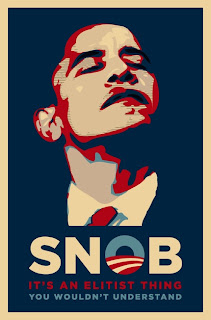Christine O'Donnell, Anne Appelbaum, Clarence Page, elites, and elitism

Anne Appelbaum of the Washington Post is admittedly wordier and more indirect in getting to her point than Clarence Page of the Chicago Tribune is. But it's a point that's as silly as it is old. Really, really old.
Every so often some left-of-center scribe will write an item condemning complaints about liberal elitism (whether of the political or the cultural variety) by pointing out that being elite is good. And indeed it is. The problem is that this particular ancient red herring is based upon a confusion of which no college graduate- whether or not the graduate of an elite college- should be guilty: the confusion of the concepts "elite" and "elitist."
The Merriam-Webster On-Line Dictionary defines the word "elite" as
The same dictionary, however, defines elitist thus:
Nobody- including Senate candidate Christine O'Donnell- would deny that Yale is an elite university, in the sense of "a" and "b" of the first definition of "elite" given above. The mischief comes in when Ms. Appelbaum, Mr. Page, and others who have made the same lame argument disingenuously pretend that it is in sense "a" or sense "b" that O'Donnell uses the word when she speaks disparagingly of Yale as an elite institution. In fact, she is rather obviously using the term according to definitions "c," and/or "d."
Further, were such as Ms. Appelbaum and Mr. Page to be intellectually honest, they would concede that this is self-evidently the case, exposing their disingenuous questions about why anyone would criticize Yale- or whoever- for excellence as so much elitist posturing.
It is not necessary to be elite in order to be an elitist, you see. It is necessary only to perceive oneself as better than others, to look down one's nose at them- and to assume that definitions "c" and "d" of the word "elite" equate to definitions "a" and "b."
They don't- and the failure of Page, Appelbaum, and so many other liberals who may or may not be elite in senses "a" or "b" to recognize that is what makes them elitists.
Every so often some left-of-center scribe will write an item condemning complaints about liberal elitism (whether of the political or the cultural variety) by pointing out that being elite is good. And indeed it is. The problem is that this particular ancient red herring is based upon a confusion of which no college graduate- whether or not the graduate of an elite college- should be guilty: the confusion of the concepts "elite" and "elitist."
The Merriam-Webster On-Line Dictionary defines the word "elite" as
1 a :singular or plural in construction : the choice part : cream
b :singular or plural in construction : the best of a class
c :singular or plural in construction : the socially superior part of society
d : a group of persons who by virtue of position or education exercise much power or influence
e : a member of such an elite —usually used in plural
2: a typewriter type providing 12 characters to the linear inch
— elite adjective
The same dictionary, however, defines elitist thus:
1: leadership or rule by an eliteOne need not be elite to be an elitist. One need only be sufficiently convinced that one is to be a snob about it. This is not a difficult distinction. Strange how many journalists like Ms. Appelbaum and Mr. Page have such trouble with it.
2: the selectivity of the elite; especially : snobbery
3: consciousness of being or belonging to an elite
— elit·ist\-ˈlē-tist\ noun or adjective
Nobody- including Senate candidate Christine O'Donnell- would deny that Yale is an elite university, in the sense of "a" and "b" of the first definition of "elite" given above. The mischief comes in when Ms. Appelbaum, Mr. Page, and others who have made the same lame argument disingenuously pretend that it is in sense "a" or sense "b" that O'Donnell uses the word when she speaks disparagingly of Yale as an elite institution. In fact, she is rather obviously using the term according to definitions "c," and/or "d."
Further, were such as Ms. Appelbaum and Mr. Page to be intellectually honest, they would concede that this is self-evidently the case, exposing their disingenuous questions about why anyone would criticize Yale- or whoever- for excellence as so much elitist posturing.
It is not necessary to be elite in order to be an elitist, you see. It is necessary only to perceive oneself as better than others, to look down one's nose at them- and to assume that definitions "c" and "d" of the word "elite" equate to definitions "a" and "b."
They don't- and the failure of Page, Appelbaum, and so many other liberals who may or may not be elite in senses "a" or "b" to recognize that is what makes them elitists.


Comments